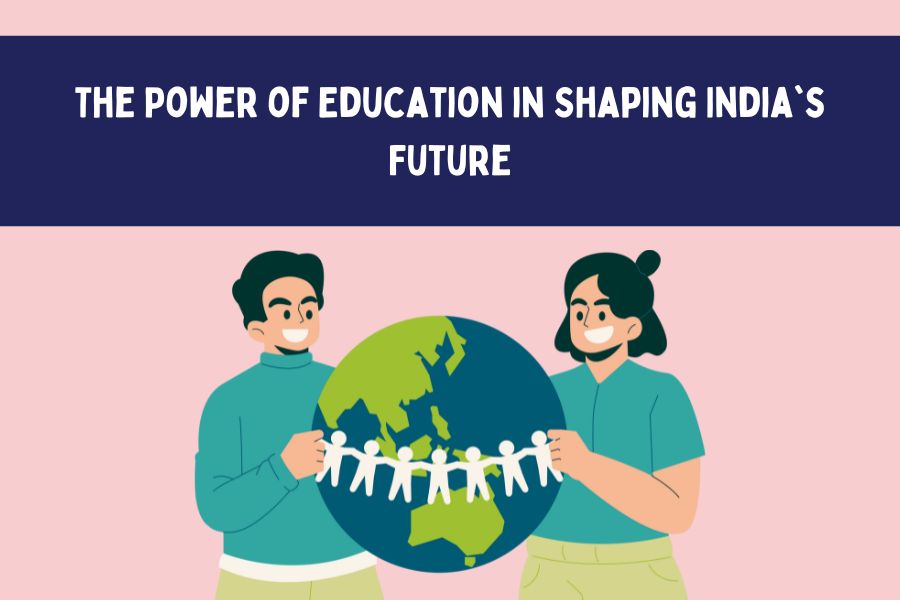The Power of Education in Shaping India's Future

Strong 8k brings an ultra-HD IPTV experience to your living room and your pocket.
Education is not merely a means to acquire knowledge but a transformative force that empowers individuals, uplifts families, and drives national progress. In a country like India, with its diverse population and dynamic socio-economic landscape, education plays an even more vital role. It bridges gaps, challenges outdated norms, and provides the tools necessary for a better future. A well-educated population contributes not only to economic growth but also to a more just and equitable society.
Barriers to Accessing Quality Education
Despite efforts over the years, access to quality education still remains uneven across India. Rural areas, economically weaker sections, and certain marginalized communities often struggle to receive consistent and quality learning opportunities. Infrastructural challenges, lack of trained teachers, gender bias, and economic constraints further deepen the education gap. Children in under-resourced settings may drop out early or receive an education that does not equip them with real-world skills.
Government Initiatives for Inclusive Learning
Over the past few decades, the Indian government has launched several programs to make education more inclusive and accessible. Policies like the Right to Education Act, the Sarva Shiksha Abhiyan, and the National Education Policy (NEP) 2020 emphasize equal opportunities for all. The aim is to ensure that every child—regardless of background—has a chance to learn, grow, and thrive. These initiatives also focus on digital learning, teacher training, and curriculum updates to meet modern demands.
Promoting Girls’ Empowerment Through Education
One of the most critical areas of focus in India's educational landscape has been addressing the gender gap. Several education schemes for girls in India have been implemented to encourage school enrollment, reduce dropout rates, and ensure continued learning. Schemes such as Beti Bachao Beti Padhao, Sukanya Samriddhi Yojana, and Kasturba Gandhi Balika Vidyalayas offer both financial incentives and infrastructural support. These programs aim to break deep-rooted cultural biases and give girls a fair chance at academic and professional success. As education for girls improves, communities witness a positive ripple effect—rising health standards, economic independence, and social equality.
Technology as a Catalyst in Learning
The digital revolution has brought significant shifts to the way children learn. With smartphones, online classes, and educational apps, students from even remote areas now have access to quality content. While challenges like internet connectivity and digital literacy persist, the use of ed-tech platforms has opened new doors for innovation. This shift is helping students overcome geographic limitations and is slowly transforming the traditional classroom into a more interactive and engaging learning space.
The Role of Community-Led Initiatives
Beyond government interventions, community-driven solutions play a powerful role in ensuring education reaches the last mile. Local leaders, school committees, and parents are increasingly participating in decision-making and school management. This participatory approach ensures that the solutions are contextual and cater to the real needs of the community. Additionally, peer learning, after-school support, and mentorship initiatives driven at the grassroots level have significantly improved attendance and learning outcomes.
Supporting Education Through Civil Society
Non-governmental organizations (NGOs) are instrumental in filling the gaps left by the public education system. A dedicated NGO for education in India often works with underserved communities, providing academic resources, remedial classes, teacher training, and digital access. Organizations like Pratham, Teach For India, and Akshaya Patra have made significant contributions to literacy and school retention. These NGOs collaborate with government bodies and local schools to scale their impact, helping children not just stay in school but succeed in their academic journeys. Their work also includes sensitization around the importance of education, especially among parents and guardians who may otherwise deprioritize schooling due to financial pressures.
Bridging the Urban-Rural Divide
Urban centers generally enjoy better infrastructure and access to quality teachers, while rural areas lag behind. To bridge this divide, mobile schools, community libraries, and rural teacher fellowships are being introduced. These models aim to bring parity in learning experiences, irrespective of a student’s location. More innovative solutions like solar-powered classrooms, video-based learning modules, and vernacular content are now being adopted to make rural education both effective and sustainable.
Skill Development and Future Readiness
Education today must go beyond rote learning and academic performance. The focus is shifting toward skill development—communication, problem-solving, creativity, and digital literacy. Programs integrating vocational training with secondary education are being piloted to make students job-ready. These efforts are essential to reduce unemployment and align with the demands of a modern workforce. Moreover, exposure to real-world applications, internships, and entrepreneurial modules are gradually becoming part of advanced schooling models.
The Way Forward: A Unified Effort
India’s education journey is at a pivotal moment. With government policies, civil society participation, and growing community awareness, the momentum for reform is strong. Yet, ensuring quality education for every child remains a monumental task. It requires a unified effort from all stakeholders—teachers, parents, policymakers, and change-makers. By nurturing an ecosystem that values learning and inclusion, India can unlock the potential of millions of young minds. In doing so, the nation not only invests in its future but honors its democratic promise of equal opportunity for all.
Note: IndiBlogHub features both user-submitted and editorial content. We do not verify third-party contributions. Read our Disclaimer and Privacy Policyfor details.


